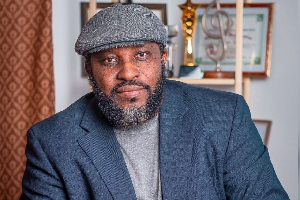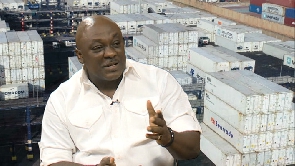A Deputy Minister for Trade and Industry, Carlos Ahenkorah, has expressed the view that the new Integrated Customs Management System that has been rolled out by the Ghana Revenue Authority, would portray an improved form of the paperless system.
“This is proper paperless. You would not hold a single paper. Even with the banks, you’ll have to pay online,” he stated.
Carlos Ahenkorah who doubles as the Member of Parliament for Tema West, made this submission while discussing the National and Continental Trade Agenda Before and After the COVID-19 pandemic on the Eye on Port platform live on National Television.
He emphasized that although the system like any other customs management system, in its beginning stages would have teething issues, users can still have confidence in the reliability of the new system as it would improve trade facilitation.
“If we roll out ICUMS, it is going to be the fastest that you will ever see in Africa, because now as we speak, compliance is virtual, so I get my UCR, develop my IDF and put it in. Formerly, you have to develop your IDF with GCNet, and you do the UCR with West Blue,” he added.
The Deputy Minister in Charge of Trade, however, encouraged port users to tarry awhile in their judgement on the efficiency of the system as early inefficiencies experienced are typical of such systems, citing similar experiences when GCNet took over at the time he was the Chairman of the Tema Branch of the Ghana Institute of Freight Forwarders.
“I’ve been in the port too long to witness some of these changes…In the 2000s when GCNet came into being, myself and other senior members of GIFF, went on the field to ensure GCNet would succeed. Because it was the same issue. When they were coming, all of us, forwarders were not happy because nobody likes change. But we had to make sure we got ourselves committed and got others towing in.”
Mr. Ahenkorah stated that Government decided to hand over the management of Customs systems to Ghana Link because West Blue and GCNet did not demonstrate the desired cooperation as well as failed to help Government maximize revenue generation at the expected levels.
“We came in and realized that the two systems were not talking or were operating in a way that there were too many loopholes for things to happen, and government was not maximizing revenue collection as we wanted.”
Again, he said it was of Government’s belief that ICUMS would provide improved security of data of revenues collected.
“We needed a step up in security with regards to revenues collected. Government doesn’t sit in the ports to collect their money. Customs Officers don’t take money. It is the banks that receive the money…Government needed a bit more security to ensure that those monies collected are what we are projecting,” he explained.
The Deputy Minister in charge of Trade also revealed that UNIPASS was slated for use to help Customs Valuation in 2015 only for West Blue to suddenly win over the contract.
“It was UNIPASS that came into the country to train customs officers and setting up their systems for 6 months and were ready to roll out and start a business only for the government then to go to Nigeria to bring West Blue in, to kick UNIPASS out,” he disclosed.
Carlos Ahenkorah educated that ICUMS is replacing the GCMS component serving as a Customs Security Server controlling the processing of customs declarations and revenue mobilization whereas UNIPASS is the trade net platform.
Business News of Saturday, 2 May 2020
Source: Eye on Port
Carlos Ahenkorah calls for port users to keep faith in new ICUMS
Entertainment












